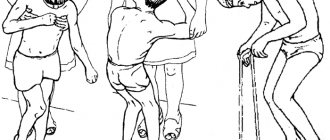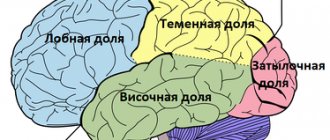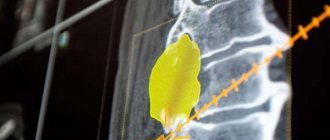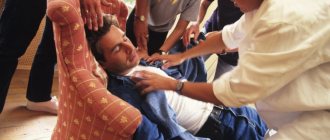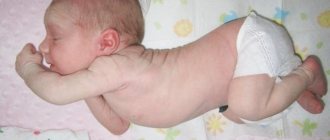Causes of delirium tremens
Alcoholic delirium (delirium tremens) usually begins with withdrawal syndrome, when the patient abruptly stops drinking alcohol.
Usually by this point 2-4 days have passed after the binge, although in some cases delirium tremens can begin directly during the binge. Experts note that often the impetus for its development is an infectious disease or an exacerbation of a chronic infection. When delirium first occurs, it is usually associated with a period of prolonged drinking. In further cases, delirium tremens may also occur during a short period of heavy drinking. There is only one way to avoid delirium - start treating addiction. After all, the reasons for the occurrence of such a condition are simple - it is alcoholism itself as such.
The first signs of delirium tremens can be noticed and tracked even before the attack begins. Certain symptoms (precursors) occur:
- The patient suddenly loses his usual craving for alcohol, and may even develop an aversion to it.
- A state of increased arousal occurs, and the mood often changes. This is very different from the usual condition that accompanies a hangover. With it, alcoholics usually have an even, anxious, depressed mood.
- Sweating and trembling (tremor) of the limbs appear.
- Insomnia occurs, and subsequently nightmares occur.
If one of your loved ones suffers from alcohol addiction, and you notice similar warning symptoms, be sure to consult a doctor. With further development, delirium can have the most detrimental consequences. Do not forget that delirium tremens is essentially a form of psychosis, when the patient does not control his actions and can be dangerous to himself, and other people can also suffer from his actions. To avoid danger, it is best to immediately consult a doctor and begin appropriate treatment.
Alcohol delirium, as a rule, develops at the chronic stage of alcoholism after 5-7 years of constant drinking. But in some cases, if the addict’s condition is complicated by one or another mental illness, the symptoms of delirium tremens can make themselves felt at the 1st and 2nd stages of alcoholism. [2]
The mechanism of development of the disease has not been fully established, but some experts believe that metabolic disorders in brain tissue caused by long-term heavy drinking play an important role in its development. When an addict abruptly stops drinking alcohol, withdrawal symptoms intensify significantly, accompanied by severe symptoms of delirium tremens, the consequences of which can cause serious harm to health.
People at risk:
- previously suffered traumatic brain injury,
- constantly consuming surrogate alcoholic drinks,
- have suffered severe psychological trauma,
- practicing dubious folk methods of abruptly quitting binge drinking.
Experts believe that “bad” heredity also increases the risk of developing delirium tremens. [2]
When considering the topic “Delirium tremens: symptoms, treatment at home,” you also need to talk about the main causes of this problem. Thus, delirium tremens may appear:
- After heavy and prolonged drinking bouts.
- After consuming low-quality alcoholic products.
- With pronounced somatic pathologies.
- With organic brain damage.
It is also important to note that the pathogenesis of delirium tremens is not yet fully understood. However, scientists argue that the main problem in this case is a disruption in the exchange of neurotransmitters in the central nervous system, as well as severe intoxication of the body.
Delirium tremens can develop due to the following factors:
- A sudden cessation of drinking alcohol due to alcohol dependence (popularly called a “hangover”).
- Large volume of alcoholic beverages consumed.
- Infectious diseases.
- Traumatic brain injuries.
Hospital
It is better to treat delirium tremens in a clinical setting. Before starting to do this, the patient must give up alcohol. After a few days of sobriety, a comprehensive diagnosis is carried out.
To cure such psychosis, the patient is prescribed a number of therapeutic measures.
- First, the body is detoxified; it is necessary to remove all toxic substances from the blood - the breakdown products of ethanol. It is also necessary to normalize blood pressure, heart rate and breathing. The patient is intravenously injected with sodium hydroxybutyrate, Sibazon solution and other drugs that have an absorbent effect.
- Teturam, Esperal, Antabuse, ProPro Ten-100 are used as medicinal drugs. These drugs are used only after the body has been completely cleansed of toxic substances. They reduce cravings for alcohol and cause aversion to it in the patient.
- To calm the nervous system, depression and apathy, as well as for severe withdrawal symptoms, the drugs “Glycine” and “Phenibut” are used. These drugs have metabolic, sedative and anti-withdrawal effects.
- For convulsive conditions and tremor, Carbamazepine or Hydantoin are prescribed.
- To reduce symptoms such as fear, anxiety, and hallucinations, a person is prescribed Phenazepam, Diazepam, Seduxen or Elenium. These medications are relaxing and have a mild hypnotic effect.
- The drug "Tiaprid" is used extremely rarely and only in cases of severe aggression on the part of the patient.
Treatment of a patient in an inpatient setting lasts about three weeks. During this time, the patient receives the necessary drug therapy, as well as the help of a psychologist. Conversations with a specialist help the patient recover faster and give up the addiction forever.
Read also: Master herb detox foot patch reviews
First aid
Delirium tremens occurs only in the second and third stages of alcoholism. To develop these stages, you need to abuse alcohol for at least five years.
However, it is worth remembering that women move to these stages faster than men, which is why they can catch a squirrel a little earlier, about three years after the start of their passion for alcohol.
By the way, young people rarely suffer from delirium tremens. Squirrel comes to alcoholics at an older age, mostly after forty.
• Chronic drinkers for at least 4 years (for women 3); • Beginning alcoholics who have previously suffered from inflammatory diseases of the central nervous system, such as encephalitis or meningitis; • Those who have already caught squirrels before; • Alcoholics during an exacerbation of various diseases.
Basically, the onset of delirium tremens is indicated by trembling of the upper and lower extremities. Due to extreme excitement, the alcoholic is unable to fall asleep. And suddenly he managed to fall asleep, then his sleep is visited by horrors from which he awakens.
• During delirium tremens, the alcoholic hears voices and sounds, rustling sounds. He can hear anything: swearing, pleas for help, growling animals. He rushes about, trying to hide from a non-existent danger, or in an attempt to save the world or relatives.• An alcoholic who has caught a squirrel imagines wild animals, huge insects, maniacs, zombies, vampires and other evil spirits.
Basically all those whom an alcoholic fears in life. He may feel like he is tied up or entangled in something, and will try to free himself.• In a state of delirium tremens, the alcoholic feels insects or snakes crawling on him. He may feel like someone is scratching or biting him, hitting him, or shooting at him. And this can last quite a long time.
You can understand all this by the facial expressions of an alcoholic. You will see an expression of horror. He will rush around the apartment, trying to hide from invisible monsters, trying to get out of some kind of shackles, trying to save someone. In short, everyone has their own squirrel, but it is very easy to see it from the outside. There is little to confuse this condition with. And it’s not easy to ignore such behavior.
You need to know how delirium tremens progresses only in order to know when to call an ambulance; it is impossible to cure it on your own. A timely called ambulance can save not only the patient’s psyche, but often his life. Yes, sometimes the lives of loved ones, because an alcoholic can mistake you for a monster and hack you to death with an ax.
The only thing you can do while waiting for the emergency room is to make sure that the alcoholic in this state does not harm himself or others.
The best way to keep him and others safe is to put him to bed and tie him to the bed. It is advisable to try to give him water to drink, since high temperatures cause severe dehydration in an alcoholic.
Don't give him any medicine. In no case. This can lead to terrible complications. In case of any psychosis, a person cannot be treated at home. Emergency doctors will give him the injections necessary in such cases.
I will not write the names of the drugs in order to avoid the fact that someone will use this to provide help to the patient on their own. And this can lead to negative consequences, since only the doctor can choose the right drug and calculate the dose.
After the injections, the ambulance should take the alcoholic with delirium tremens to the psychiatric ward.
Clinical signs of alcoholic delirium develop 72 hours after the last dose of alcohol consumed. If sudden withdrawal occurred against the background of previous operations or injuries, the first symptoms may appear already on the first day.
Characteristic signs develop depending on the stage of the disease.
This phase is identical in most symptoms to withdrawal syndrome. In the morning hours, the illness is reflected in the mental state and physiology:
- Loss of orientation in familiar places, loss of sense of temporal perception.
- Hyperthermia. Body temperature can increase up to 39-40 degrees.
- Frequent intermittent breathing, tachycardia.
- Sudden, paroxysmal headaches.
- Diarrhea.
- Systematic vomiting.
- Neurological disorders – slurred speech, etc.
- Cramps.
- Redness of the face and eyes.
In the evening the following may appear:
- Tremor (shaking) of hands.
- Growing excitement.
- Hallucinations.
- Nightmares, insomnia.
If a person resumes drinking alcohol during this phase of the disease, he returns to his normal state.
This stage is characterized by rapid development of symptoms. Spontaneous healing is considered impossible. This is a characteristic syndrome of delirium tremens (delirium tremens).
Signs of the second stage:
- Hallucinations increasing in strength and duration. A person hears the movement of shadows, slamming doors, footsteps, and bells.
- Intensification of delusional states, delirium becomes obsessive. The person thinks that he is being persecuted, that they want to harm him, kill him, etc.
- Body temperature rises to 39 degrees and above.
- The patient experiences irritation in relation to bright light, sound and other factors.
- Increasing autonomic hyperactivity.
- Aggressive states are sharply replaced by general excitement and vice versa.
- Breathing becomes frequent and intermittent (up to 26/min.).
- There is deterioration in sleep. Dreams become nightmarish and difficult.
If the patient does not receive appropriate medical care, he is doomed to develop delirium tremens into the third, final phase.
The extreme degree of the disease is characterized by the following symptoms:
- Aggressive exacerbations are replaced by complete and deep attacks of apathy;
- The person experiences weakness and mental and physical inhibition;
- All reactions are sluggish;
- An extreme degree of delusional states is observed - a quiet voice, awkward and incoherent speech;
- Tremor spreading throughout the body;
- Convulsive seizures, epileptic seizures;
- Tachycardia, shortness of breath;
- Insomnia is accompanied by illusions and hallucinations that are profound in their strength and brightness.
In the absence of proper qualified medical care, the third phase of delirium tremens, against the background of excessive depression of consciousness, develops into a coma. This can lead to permanent brain damage, hemorrhage, brain swelling and death. No one can predict the extent of the defeat.
Alcohol delirium fully manifests itself on the 2-4th day after a sharp cessation of alcohol. The onset of delirium tremens is preceded by typical symptoms of acute withdrawal syndrome:
- sleep disorders,
- feeling of anxiety,
- anxiety,
- vomiting and diarrhea,
- lack of appetite,
- limb spasms,
- headache. [3]
When delirium develops, a person's condition quickly deteriorates. The following signs are characteristic of delirium tremens:
- auditory and visual hallucinations,
- confusion,
- temporary loss of consciousness,
- impaired speech,
- hand tremors,
- skin redness,
- yellowing of the whites of the eyes,
- high blood pressure,
- cardiopalmus,
- increased sweating,
- epileptic seizures. [3]
The duration of delirium tremens can be 5-7 days. If the first symptoms of pathology occur, the patient is provided with first aid, which consists of performing certain manipulations:
- During the period of assistance, it is recommended to fulfill one important condition. The patient should not be given medications immediately.
- The patient is placed in a horizontal position and everything possible is done to calm him down. If the patient is excessively aggressive and inappropriate, his upper and lower limbs are tied.
- Care must be taken to ensure that there are no foreign objects near the patient that could cause injury or harm to others.
- The patient is advised to provide a cool temperature in the room. For this purpose, windows and doors are opened in winter. If an attack occurs in the summer, the patient is placed under a cold shower. An effective remedy in this case is a cold compress, which is applied to the forehead. When one of them is heated, the compress is changed.
- For delirium tremens, treatment at home requires the use of drugs with a sedative effect - Piracetam, Diphenhydramine. If they are not available in your home medicine cabinet, the use of traditional medicine is recommended. In this case, decoctions are made from plants such as lemon balm, chamomile, and sage. With their help, they reduce arousal and normalize sleep.
- In order to calm the patient, it is recommended to talk to him quietly. Quarrels and accusations are strictly prohibited. This is explained by the fact that the patient cannot really perceive reality. Relatives must understand the patient and care for him. A patient with delirium tremens needs support.
It is not recommended to treat pathology at home, as this can lead to various complications. This is why it is recommended to call an ambulance.
Initially, you need to tell us when the first symptoms of delirium tremens may appear in alcoholics. So, it is worth noting that very often people do not identify them as such. Often they are simply confused with the so-called budun or otkhodnyak. Delirium tremens is indicated by trembling of the hands, increased sweating of a person, fluctuations in body temperature, redness of the eyes and face.
However, these problems are often mistaken for symptoms of a disease that has absolutely nothing to do with the consequences of drinking alcohol. In this case, the patient’s relatives should pay attention to his sleep. So, he will be weak and restless. And before bed, outbursts of anger or mood swings can often occur. The problem is also indicated by deviations in human behavior, mental breakdowns and fluctuations in the functioning of the nervous system.
Occurrence of the disease
The first stage of competent treatment of a pathological condition is to determine the symptoms of the pathology. The disease is accompanied by:
- Headache;
- Nausea;
- Vomiting.
The patient's speech with pathology is incoherent. The pathological process is often accompanied by convulsions. Patients' limbs and facial muscles tremble. Patients report disturbed sleep and frequent nightmares. The delirium tremens type is accompanied by a change in the color of the tongue and face.
With pathology, patients become overly excited, which leads to mood swings. People with pathology become overly anxious. In some cases, there is an increase in body temperature. The pathology is accompanied by hyperhidrosis, in which sweating increases. Patients experience increased blood pressure and increased heart rate.
In delirium tremens, auditory and visual hallucinations occur. Patients claim that they see non-existent people, insects, and scary images. Against the background of hallucinations, a person experiences inappropriate behavior, since he cannot expel them. When voices appear in the head, suicide is noted. In this case, a person can injure or kill other people. Representatives of the stronger sex experience the appearance of anger and jealousy.
Most patients become overly suspicious. They believe that there is a conspiracy against them or that they are being persecuted. Excessive aggression makes the patient dangerous to others. Representatives of the fairer sex most often experience depression. Sometimes aggression appears.
Delirium tremens lasts on average 3-5 days. In narcology, it is customary to distinguish 3 stages of the disease. [3]
| Stage 1 (threatening delirium) | Hallucinations begin to appear mainly in the evening. At first, these are unclear visual illusions and increased anxiety, which further increase the patient’s sensitivity to external stimuli. The person is restless, practically does not sleep, does not eat at all, and talks to himself. There is a slight increase in body temperature and sweating. If an addict at the initial stage of delirium begins to drink again, then all symptoms gradually go away |
| Stage 2 (complete delirium) | Hallucinations become more and more vivid. Stories from patients about delirium tremens prove that these can be a variety of illusions - dead relatives, movie characters, friends, mythical creatures, animals. Hallucinations become so realistic that a person may completely lose touch with reality. The body temperature becomes higher, the heart rate increases to critical levels. The patient may become aggressive because the hallucinations frighten him. Alcoholic delirium at stage 2 cannot be cured on its own. Immediate medical intervention is required |
| Stage 3 (life-threatening delirium) | The patient's nervous excitement decreases. Delirium tremens during this period manifests itself in completely incoherent speech. Severe cramps may occur periodically. Hallucinations continue, accompanied by simple stereotypical actions - flapping limbs, turning the head, moving the lips. A person ceases to understand who he is and where he is. May not recognize loved ones, fall into epileptic seizures. The patient's depressed state progresses. Cerebral edema may develop, which can lead to coma and further death. |
What other symptoms of delirium tremens are there after binge drinking? So, the manifestations of this problem also depend on the stage of its development:
- Korsakov psychosis. This is the first stage when the patient experiences memory, attention, and sleep disorders. Those. neurological disorders are present.
- Rave. This is a more serious stage. Psychosis has not yet become severe as long as there are no hallucinations. But the condition is gradually worsening.
- The third stage in medicine is called severe. All sorts of neurological disorders are already manifested here. It is in this case that they talk about classic delirium tremens.
Symptoms that may appear in a patient:
- Migraines, tinnitus, headache.
- Lack of appetite.
- Increased anxiety.
- Aggressiveness, sudden mood swings.
- Tremor of the limbs.
- Increased sweating.
- Hallucinations: tactile, visual, auditory.
- In some cases, seizures occur.
Symptomatic picture
Let's consider the manifestations of alcoholic delirium, which often manifest themselves in drunkards. The first symptoms of delirium tremens are:
- a sharp increase or decrease in blood pressure;
- chills, tremors in the limbs, increased body temperature;
- sleep is disturbed, the patient constantly wakes up, he periodically has nightmares;
- increased sweating;
- inhibition of brain activity, due to which a person begins to speak slowly, slurred, and sometimes stutters;
- aggression and overexcitement suddenly turn into apathy and lethargy;
- a person can talk to voices or run somewhere, scream, run away from someone;
- heart rhythm disturbances.
We invite you to familiarize yourself with Advice from an Experienced Person: 15 Difficulties for Those Quitting Drinking
Alcohol delirium also affects a person’s appearance. His eyes turn yellow, his complexion changes, and his tongue becomes covered with a white coating.
Auditory and visual hallucinations are equally common symptoms of delirium tremens. After drinking, a person may see some scary creatures, insects or animals. As a result of this, the patient behaves inappropriately, trying to get rid of such visions.
Features of treatment
According to statistics from narcologists, there are much more male patients with symptoms of delirium tremens admitted to hospital for treatment than women - about 90% of all identified cases. There is no specific explanation for this “exacerbation” of withdrawal symptoms. Some doctors believe that men, unlike women, are more likely to go on long-term binges, and this is what causes the development of delirium tremens.
In female patients, delirium tremens can occur even after 3-4 years of continuous alcohol consumption. This is due to physiological characteristics - in a woman’s body there are fewer enzymes that break down ethanol, which means alcohol intoxication occurs earlier with constant consumption of alcohol-containing drinks. [2]
In general, the symptoms of delirium tremens are similar in men and women. But patients more often experience abortifacient hallucinations. This state is characterized by less disturbance of consciousness; illusions do not cause loss of orientation in time. The condition worsens for 2-3 hours, then a temporary “calm” comes. [2]
Medical practice has established that delirium tremens in women is more pronounced. Patients are much worse than men (with the same “experience” of alcoholism) tolerating a deterioration in their physical condition, which complicates and delays the treatment process. The rehabilitation period after detoxification of the body is also difficult. After treatment for psychosis, women are more likely than men to experience a depressed emotional state. [2]
What to do during delirium tremens can only be determined by a doctor after a preliminary examination of the patient. That is why therapy at home is not recommended, as this can lead to unwanted effects. Popov’s excellent home method will allow you to get rid of the symptoms of the pathological process at home.
It is recommended to prepare a mixture based on 100 milliliters of distilled water, three tablets of Phenobarbital or Luminal, and 15 grams of 96 percent medical alcohol. It is recommended to mix all components thoroughly and give the patient a drink at one time. If it is not possible to prepare such products, it is recommended to use similar drugs:
- Diuremide;
- Frisium;
- Keppra;
- Tebantina, etc.
The choice of a particular drug and its dosage should be determined only by the doctor in accordance with the severity of the disease, as well as the individual characteristics of the patient.
ethnoscience
In order to eliminate the symptoms of the disease, it is recommended to use traditional medicine, which is characterized not only by its effectiveness, but also by a high level of safety. They are prepared on the basis of:
- Collecting herbs. The medicine is prepared using yarrow, wormwood, and thyme. The above-ground parts of the plant are pre-crushed and dried. It is recommended to take them in equal quantities and mix thoroughly. 60 grams of the resulting composition should be poured with 250 milliliters of boiling water. After infusing for several hours, the product must be filtered and taken at one time.
- Bay leaf. Several leaves of the crop are taken and thoroughly crushed. They need to be mixed with lovage roots and poured with vodka. The drug is infused for a week in a cool and dark place. After this, the mixture is filtered and taken orally, a few drops, which are pre-mixed in 50 milliliters of water.
- Bitter wormwood. The ground crushed part of the plant is mixed with yarrow in equal quantities. 25 grams of raw materials are poured with one hundred milliliters of vodka. The medicine must be infused for 11 days, and after that taken by analogy with the previous prescription.
Despite the high effectiveness and safety of medications, it is recommended to consult a doctor before using them. Otherwise, a deterioration in the person’s condition may occur.
At home
The use of home remedies is possible only in a situation where the acute stage is completely removed.
Before doctors arrive, it is recommended to place the patient on a bed, tie his limbs if necessary, and give a large dose of absorbent medications, the most common of which is simple activated carbon. To eliminate the consequences of an attack, use:
- taking medications for fever and high blood pressure;
- for excitability and insomnia, use a sedative prescribed by a doctor;
- It is recommended to fast on the first day after an attack, at which time the patient is given a large amount of plain water;
- from the second day, a diet high in vitamins and carbohydrates is introduced, spicy and fatty foods are completely excluded.
During home therapy, alcohol is completely excluded. The “folk way” to bring the patient out of delirium tremens leads to further deterioration of the condition due to increased abstinence. Traditional medicines such as honey, rich in potassium, are used. The patient is given at least two full spoons every day.
The use of oat decoction with calendula seeds helps improve the condition. This composition improves metabolism. To make it, pour two liters of water into 100 grams of oats and 20 calendula flowers. The decoction is given in small portions every 2-3 hours. Chamomile infusion is used as a sedative.
The patient is given medications prescribed by the doctor that help restore blood circulation, lower blood pressure, relieve depression and improve metabolic processes.
What to do if a person has delirium tremens
In severe forms, resuscitation measures are necessary. Such manipulations are carried out in a specially equipped ward at a psychiatric hospital.
Emergency care is aimed at restoring the patient:
- Decreased intracranial pressure (high probability of developing cerebral edema);
- Stabilization of autonomic excitability;
- Fighting insomnia. Sleep becomes a sign of the imminent end of the illness;
- How to develop a strategy for proper behavior with an alcoholic
To relieve alcoholic delirium, significant doses of tranquilizers are mainly used:
- To choose from – “Seduxen”, “Diazepam”, “Relanium”;
- "Elinium";
- "Phenazepam";
- A combination of psychoactive substances with sleeping pills - “Diphenhydramine” and “Barbamyl” or “Diprazine”.
To eliminate intoxication and support cardiac activity, use:
- “Glucose”, “Korglikon”, “Cordiamin”, “Hemodez”;
- In the early stages of delirium tremens, Prednisolone is indicated.
To restore the body, vitamins are prescribed:
- B vitamins;
- "Nicotinic acid";
- "Ascorbic acid."
Other primary manipulations:
- With increasing hypertension, sodium chloride solution is prescribed;
- To prevent cerebral edema, Lasix is used;
- Panangin and Reopoliglucin are used to restore metabolism.
It is impossible to independently organize treatment for the disease. Professional medical intervention is required. The only thing that family and friends can do is to put the patient to bed, perhaps tie him up, and provide plenty of fluids for detoxification.
It is possible to get rid of delirium tremens that occurs after a long binge, where the patient receives a complex effect:
- Relief of excitement;
- Restoration of metabolism, hemodynamics;
- Normalization of respiratory and cardiac activity;
- Elimination or prevention of renal and hepatic disorders;
- Prevention or treatment of cerebral and pulmonary edema;
- Equalization of body temperature.
If there is a person in the house who exhibits all the signs of delirium tremens, it is necessary to call an ambulance or contact special clinical institutions that are ready to provide a qualified narcologist with a house call. At home, the patient feels more confident and protected, which also contributes to recovery.
Treatment of alcoholic delirium at home can be dangerous for a person!
Patients with delirium tremens are often unable to take care of themselves - deteriorating physical condition and constant hallucinations confuse the mind. A person often does not understand what is happening to him and cannot take the simplest action - call an ambulance. Therefore, responsibility falls largely on loved ones.
Have you noticed that when a person suddenly quits drinking alcohol, the addict exhibits symptoms that are not typical of “normal” withdrawal symptoms? Especially an epileptic attack - as experience shows, delirium tremens will almost certainly begin in the evening. Therefore, call an ambulance immediately. Any of your actions aimed at home treatment of delirium tremens can have negative consequences for the health of the addict.
All that is recommended to do if a person has delirium tremens is to put him to bed and wait for the ambulance to arrive. If the patient becomes aggressive, you can tie him up without blocking the airway. [4]
Possible complications and consequences of delirium tremens
The duration of delirium tremens does not affect the occurrence of complications. Even with a mild case of squirrel disease, there can be a huge number of consequences.
• amnesia; • chronic psychosis; • other mental disorders.
In addition, cirrhosis of the liver, kidney problems, cerebral edema, myocardial infarction, stroke, etc. are diagnosed. However, these are not the consequences of delirium tremens, but of alcoholism. It’s just that an alcoholic often ends up in a hospital where these diseases are diagnosed precisely because of psychosis.
Alcohol delirium can cause the development of various diseases. Brain damage in delirium delirium is pronounced. The most typical consequences are:
- Pneumonia – occurs in a third of people with delirium tremens;
- Alcoholic cardiomyopathy – develops in 25% of cases, can lead to the loss of the patient;
- Impaired absorption and metabolism of vitamins;
- Destabilization of acid-base, water-salt balance;
- Pancreatitis;
- Renal and hepatic dysfunction (eg fatty liver);
- Rhabdomyolysis is a syndrome accompanied by the destruction of muscle tissue and extreme myopathy;
- Brain swelling.
Delirium tremens may end:
- Complete recovery;
- Partial recovery – the patient remains in amnestic or organic psychosyndrome;
- Death.
There are 3 possible outcomes of delirium tremens:
Full recovery
Full recovery of the patient without any deviations in health is possible only with a minimum “experience” of alcoholism, the absence of a history of chronic diseases and timely consultation with a doctor when the first symptoms of delirium tremens appear. But such cases are extremely rare. As a rule, delirium develops after many years of drinking alcohol, when health is already “undermined.”
Recovery from deteriorating health
Complications after delirium tremens most often occur at the 2nd and 3rd stages of the disease. Among them:
- chronic psychosis;
- temporary amnesia;
- diseases of the heart, lungs, liver and kidneys. [2]
A patient who has suffered delirium tremens, after taking even a small amount of alcohol, develops alcoholic psychoses much more easily, which can lead to death.
Death
According to the data, the mortality rate of patients with acute alcoholic psychosis is about 3% of the total number of those who sought help from a doctor. A person dies from pathologies aggravated by delirium tremens. As a rule, these are heart diseases, hepatitis, pancreatitis. [5]
The chance to cope with delirium is to consult a doctor in time. If treatment is started at stages 1 or 2 of the disease, the patient's chances of survival are significantly increased.
Having understood what delirium tremens is, the symptoms, what to do if such a phenomenon occurs - you definitely need to talk about it. And all because this condition is fraught with serious complications, which may affect not only the alcoholic himself, but also his relatives and close people. Very often, being captured by hallucinations, patients commit suicide or try to fight their fears with other dangerous methods, putting their lives at risk.
Despite the danger of the consequences of hallucinations, the state of delirium tremens is extremely negative for the entire body: organs, systems. Often, after this condition, the patient is found to have serious liver damage. Bleeding and digestive disorders of varying complexity occur. During alcoholic delirium, the immune system is also significantly weakened, which leads to the fact that a person can easily become infected with various viruses and bacteria. The most serious and irreversible complication is death.
Stages of the disease
Many people believe that delirium can begin in a person after drinking a large dose of alcohol, since the person is already behaving inappropriately. But this behavior is not delirium tremens.
According to narcologists, alcoholic delirium does not develop immediately, but after several years of stable consumption of strong drinks, and manifests itself only in a sober state.
In modern medicine, there are three stages of alcoholic delirium.
- Korsakovsky psychosis. This is the case when the disease does not fully manifest itself. With such delirium tremens, a person experiences sudden mood swings. With Korsakov's psychosis, memory lapses are possible, although the patient clearly remembers all events and his habits, only some hours or days are forgotten.
- Delirium. It is common to many drunkards. With such alcoholic delirium, there are no hallucinations, but the person becomes very aggressive and constantly suspects everyone of something. There are cases when, with such delirium tremens, people commit suicide.
- A severe form of delirium appears several days after the drunkard stops drinking. Symptoms such as nausea, vomiting, severe headaches, convulsions and speech impairment indicate that delirium tremens has begun.
Read also: Thrombo Ass at what time to take
Treatment of alcoholic delirium
ethnoscience
Having studied what delirium tremens is, its symptoms, treatment at home - this is what is also important to dwell on. After all, it often happens that there is simply no way to take the patient to the hospital or call a doctor. That is why it is important to know what you can do on your own in this case.
The main tasks that therapy at home should adhere to are:
- Reducing body intoxication.
- Maintaining vital body functions at a safe level.
- Prevention of various problems that may arise as a result of delirium tremens.
If a person has delirium tremens, treatment at home must necessarily include detoxification therapy. In this case, you need to force diuresis (give as much fluid as possible, you can use various diuretics). Enterosorbents, for example, Enterosgel, work well in this direction.
It is very important to remember that it is necessary to maintain water-salt and electrolyte balance in the body at a normal level. In this condition, the loss of potassium is extremely dangerous, so you need to try to make up for the loss of this trace element.
You can also use drugs that enhance metabolism. However, most often such drugs are infused into the patient’s blood through droppers in medical institutions (glucose solution or the drug “Cytoflavin”). So, delirium tremens and symptoms are considered. Treatment at home should also include symptomatic therapy. That is, we must remember that it is necessary to treat not only delirium tremens itself, but also other problems that may arise against its background.
Delirium tremens is treated at a drug treatment clinic. The treatment regimen includes intensive detoxification of the body from ethanol breakdown products. Drug therapy is aimed at eliminating psychotic phenomena, normalizing metabolism, restoring organ functions, and preventing the development of persistent cognitive impairment.
During the detoxification process, the patient is prescribed intravenous saline solutions and vitamins. And to prevent the occurrence of disorders in brain function, the patient is prescribed nootropics.
How long treatment for delirium tremens lasts depends on the stage of the disease and the presence of other pathologies in the patient. But in any case, the period of stay in the drug treatment department of the hospital will be at least 2 weeks.
The addict is discharged from the hospital when his physical condition is restored. If the patient expresses a desire to fight the addiction, he will undergo long-term psychotherapy. Relatives must make every effort to convince the addict to fight alcoholism. Otherwise, the next time you binge, there is a risk of ending up in the hospital again with diagnosed delirium delirium.
A person can hide his addiction from others for a long time. But by the time there is a danger of the development of alcoholic delirium, it is no longer possible to “mask” the existing problem with irrepressible drinking. And if the addict himself may not be fully aware of the risks, since he has been in the grip of an addiction for a long time, his relatives should not give up.
Healing is impossible without psychotherapy, because the emotional “attachment” to alcohol, even after intensive detoxification in a dispensary, remains for a long time. At a severe stage of the disease, a person can no longer say “no” to a bad habit.
One of the new psychological methods for treating alcoholism is the 7Spsy behavior modification technology. This is a patented course based on the theories of I. P. Pavlov, B. F. Skinner, A. A. Ukhtomsky.
The training will help the addict, who has recognized the existing problem, to learn a healthy model of behavior. For many, alcohol is a means of relieving stress and relaxing. Over time, this develops into a serious addiction. By changing negative attitudes, a person learns to find more rational ways to get rid of his own fears and depression. This is the best prevention of long-term drinking bouts, and, accordingly, the development of alcoholic delirium.
The course on behavior modification technology 7Spsy is designed for up to 6 weeks. The training takes place in strict confidentiality - if it is difficult for an addict to admit to his acquaintances about his existing problem, he may not do so. The psychologist gives all the necessary consultations in a convenient remote mode - by e-mail, in chats and by phone.
Don't miss the moment when alcoholism leads to the development of delirium tremens. This is a serious addiction that requires immediate treatment.
Sources:
- “Chronic alcohol intoxication”, 2007, A. Ya. Grinenko, V. V Afanasyev et al.
- “General and private narcology: A guide for doctors,” 2008, I. N. Pyatnitskaya.
- “Emergency conditions in narcology. Textbook", 2013, O. Syropyatov, N. Dzeruzhinskaya and others.
- “Guide to emergency medical care”, 2006, S. F. Bagnenko.
- “Mortality of patients with acute alcoholic psychoses in a drug treatment hospital” (magazine “Problems of Narcology”, 2002, No. 3), A. V Karpets.
General recommendations regarding treatment at home
Many people treat delirium tremens syndrome at home. At the same time, very often a person is offered to drink alcohol, although it is given in minimal doses. To treat delirium tremens at home, people need to know the following facts:
- if the patient has become too aggressive, no home treatment will help him;
- when using traditional medicine recipes, all dosages should be clearly taken into account;
- do not use any questionable medications;
- think about further hospitalization of the patient in order to remove all toxins from his body.
Everyone should know what to do at home, but one should not neglect the competent assistance of qualified doctors.
Treating delirium tremens at home will be quite difficult. If a person is not sure that he will be able to do this at home, then it is worth calling the hospital and still spending several days in a hospital setting.
Only in this way will it be possible to solve the problem as quickly as possible and insure yourself against many complications.
Of course, to completely stop drinking alcoholic beverages, a person will need a lot of time and a lot of willpower, but drug treatment also means a lot.
At home, qualitatively, you can only get rid of the vivid symptoms of delirium tremens, but it is still better to treat the consequences of alcoholism in a hospital setting.
Under the supervision of medical specialists, the patient will be given all necessary medications. Here we should not forget that an alcoholic will require competent psychological rehabilitation.
This type of rehabilitation is also actively practiced in specialized medical institutions.
Treating delirium tremens at home is not advisable, but many people do not want to send their loved ones to the hospital. If home treatment methods are already used, then they should be used very carefully. Dealing with a patient suffering from delirium tremens is very difficult, so it is best to leave this task to qualified medical professionals.
Treatment of delirium tremens and removal of toxins from the body is quite lengthy, but the result is worth it. A couple of days before delirium tremens, you can notice certain symptoms in an alcoholic, with which you can prevent such a condition or prepare for it.
All the necessary means for therapy should always be at hand, but no one knows whether it will be possible to force the patient to take the drugs. That is why it is better to solve such problems in the hospital, rather than try to do something about it yourself.
Treatment must be carried out as correctly as possible, because only then can you get the desired result.
- Have you tried many methods, but nothing helps?
- Another coding turned out to be ineffective?
- Is alcoholism destroying your family?

